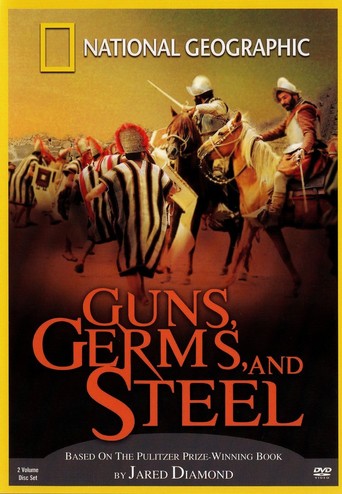rsignal
I get that Prof. Diamond is trying to answer the big questions of "why?" some civilizations invented "cargo" (material goods) and others didn't. I have not read the book, and just watched the first episode of this miniseries.A lot of the details of the argument ring true to me. The worldwide distribution of beasts of burden, types of farm crops and weather patterns all certainly have an effect of the rise of civilizations. But this can't be the whole story, or even the major part.When showing Diamond interacting wit the New Guinea folks, the emphasis was on the New Guinea struggles to get food. Hunting is inefficient, and farming is difficult labor due to the crops and lack of domesticated animals. Okay - but what was really striking is what was the lack of a written language. At the end of the episode, Diamond says something to the effect that if only geography had been different, then the New Guineans would have invented the helicopter, and not Westerners.The problem with this argument, is that in order to invent a helicopter, you must first understand fuel, energy, materials, densities, air molecules, physics, weather, and hydraulics, just to name a few things. I agree with Diamond that the New Guineans are plenty smart to understand all those things, but in order to generate knowledge, a society must have a physical way to disseminate knowledge (scrolls, printing presses, paper, etc) and culture of acceptance of new ideas (criticism of new ideas is fine, indeed necessary to refine knowledge). Diamond didn't discuss the role of culture at all, and this is a huge omission.Ultimately any theory of the rise of civilizations can be supported by cherry-picking data. This is a historians job, not a scientific endeavor. Diamond has his theory, and any number of people have their own theories. I personally don't find Diamond's theory to be very compelling.
aioerjga
"Guns, Germs and Steel" If he says it often enough, does he think we will believe it?This is probably the most thinly documented "documentary" that I have ever seen.There are no contributors, pro or con, other than Mr. Diamond. There are no citations of scientific studies, and there no inquiries into the deficiencies or contradictions of Mr. Diamond's hypothesis.We are left with only Mr. Diamond's opinions and observations.Travelling to New Guinea 30 times birdwatching does not suffice as science when attempting to explain the growth of European empires.Mr. Diamond appears to be an agreeable man, and his comments are interesting, but he demonstrates that he is a lax scientist and a very poor marksman.This series should be titled "My Travels in New Guinea."National Geographic has damaged their credibility and, therefore, their brand with this series.Although the cinematography is beautiful, and the sets and costumes are relatively lavish, I can rate it only 2 stars because of the lack of rigor in the research presented.And the answer to the question posed on the beach: Because they made it.
lucky-16
The documentary presents an original theory about "Guns, Germs and Steel". The series graphically portray several episodes strongly supporting the theory, and defend the theory against common criticism.I was deeply puzzled to find user comments complaining about lack of new information in these series. They say documentary presents information which is taught in middle school. Indeed, it does. In fact, I greatly enjoyed the original look at the information which I have known since middle school and the unexpected analysis.So, if you like knowing WHY things work, if you have taken apart the telephone trying to determine how it worked, if you have gone to the farm to see how farm works and how cows are milked, you will enjoy this series. A definite recommendation.
j_reece
Having read Diamond's book, I was slightly disappointed in the series, but all in all, it is quite informative. Reading the other comments, it is comforting to know that the 'culture warriors' are hard at work, seeing 'attacks' on 'Western Civilization' under every rug.Is Diamond a little preachy ? Sure. Like a lot of academics, he sees his theory as the most important thing ever. He uses the phrase 'guns, germs, and steel' at seemingly every opportunity during the series. We get it, after about the first 10 minutes.Is Diamond a little simplistic (in the series) ? Sure. The part about the Spaniards in South America is particularly amusing, condensing some very long, complicated history down to 'smallpox, swords, and horses', wrapping up the whole conquest of South America in about 15 minutes. But the point remains valid - these things did in fact contribute (but not totally define) the reasons for the Spaniard's success against the established cultures.Is he preaching *against* Western Civilization in any way ? Nope. Not a word. Not to my ear. All he says is that luck played a large part in determining which cultures advanced more quickly, *not* that luck is the only reason.In the end, if you're looking for something that validates your own sense of superiority, then this series is not for you. But if you are interested in all of the factors than influence how societies succeed or fail, this series presents a useful interpretation of the historical evidence.


 AD
AD

